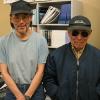
John Peter was interviewed on April 12, 2005 by Bill Schneider and Louann Rank at the school in Tuluksak, Alaska. John spoke in Yup'ik and his son, Moses Peter, translated. Marla Statscewich, Sam Peter and Iris Napoka were also present during the interview. In this interview, John talks about the history of Uuravik and Tuluksak, his education, living off the land and following a traditional subsistence lifestyle, fishing and the fish found near Tuluksak, and the effect of beaver on the landscape. Moses Peter helped to set up this interview with his father, and was instrumental in gathering the elders together to discuss traditional places around Tuluksak and the stories associated with them.
Digital Asset Information
Project: Tuluksak
Date of Interview: Apr 12, 2005
Narrator(s): John Peter
Interviewer(s): Bill Schneider, Louann Rank
After clicking play, click on a section to navigate the audio or video clip.
Sections
1) Background information.
2) Uuravik.
3) Coming to Tuluksak
4) Education and life on the land.
5) Places around Tuluksak.
6) Tuluksak.
7) Fishing and types of fish.
8) How people use the land.
9) Types of tools used to fish.
10) Types of fish in the area and how to catch them.
11) Beaver affecting the land.
12) Reason for this project.
13) Map of the area.
Click play, then use Sections or Transcript to navigate the interview.
After clicking play, click a section of the transcript to navigate the audio or video clip.
Transcript
Section 1: Yup’ik name/ born -- April 5, 1917/ Uuravik -- story about/ sister and brother -- Sophie and Nicoli Peter|
Section 2: move -- Tuluksak/ very young/ residents -- old village/ qasgiq -- men's house/ Moravian church/ Kilbuck, John -- assigned to Uuravik|
Section 3: current site -- had few homes/ other side of river -- old village/ proprietor -- Sumi/ Sumi -- Japanese business man/ sod houses -- old Tuluksak site/ miners -- Bear Creek/ Bear Creek -- tributary of Tuluksak River/ Bennett, Johnny -- horses to get supplies to miners at Nyac Mine/ guns -- bullets/ gold -- ammunition|
Section 4: BIA school -- needed at home/ Moravian Children’s Home – didn’t go/ Sophie – Children’s Home/ quit school -- subsistence life/ April -- spring camp site/ hunt -- muskrat/ Little Bogus Creek -- spring camp|
Section 5: mouth of the Tuluksak River -- no islands/ Kuskokwim River/ islands formed/ names of places -- around Tuluksak/ Akcuar-- small lake/ creek to Tuluksak River -- Yugnilnguq (Little Bogus Creek)/ Macivik -- south side of Tuluksak/ Bear Creek/ Macivik -- below the mouth of the Tuluksak|
Section 6: fish -- migration/ Tuluksak River -- Bear Creek/ salmon -- other fish/ grayling, pike sheefish -- wintertime/ king, red, dog and silver salmon -- summertime/ Dolly Varden/ mammoth tusks -- loons/ Tuluksak River -- loons/ old Tuluksak -- houses|
Section 7: whitefish -- set net/ Kuskokwim River/ jigging -- winter/ fishing -- lakes/ types of fish/ whitefish -- types of/ white fish -- different taste/ akutaq-- made with whitefish fat/ blackfish -- larger in tundra|
Section 8: tundra people/ sharing land -- subsistence/ sharing resources/ spring camp/ coastal people -- spring camp/ fur bearing animals -- hunting for/ travel -- by foot/ winter -- sled dogs|
Section 9: fishing -- net/ willow, driftwood -- fish traps/ small fish traps -- driftwood/ men’s tool -- taluyaq (fish trap)|
Section 10: water -- fish traps/ cover -- set towards current/ Macivik creek -- example/ fish -- spawn/ whitefish -- nets, fish traps|
Section 11: more beavers/ old days -- no villages/ people traveled on the land -- followed food/ change in lifestyle -- more beavers/ not being hunted/ fur prices -- decreased over the years|
Section 12: public record -- history of the area/ people anywhere can access information/ Rank, Louann -- graduate student/ Fish and Game -- no names/ Yup’ik place names -- young people don’t know them/ culture stays alive in place names/ all places have names/ summer camp/ winter camp/ fall camp/ inform community members -- place name/ search -- area|
Section 13: Place name map/ historical places -- recorded in 1988/ suggests elders come together/ Kwethluk/ place names -- meaning|

